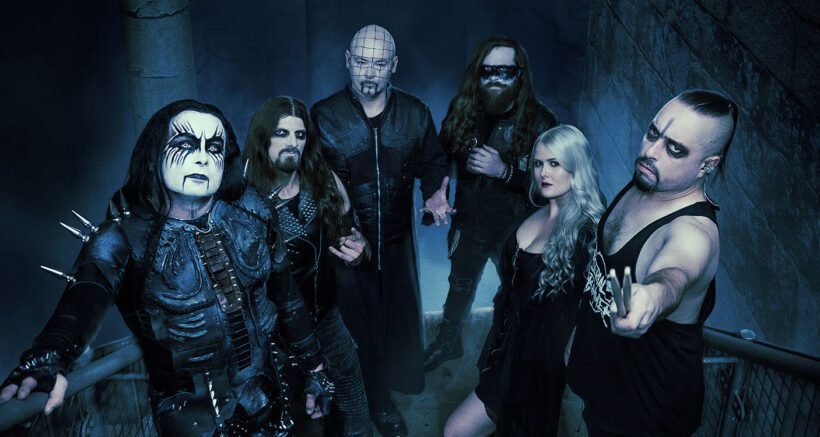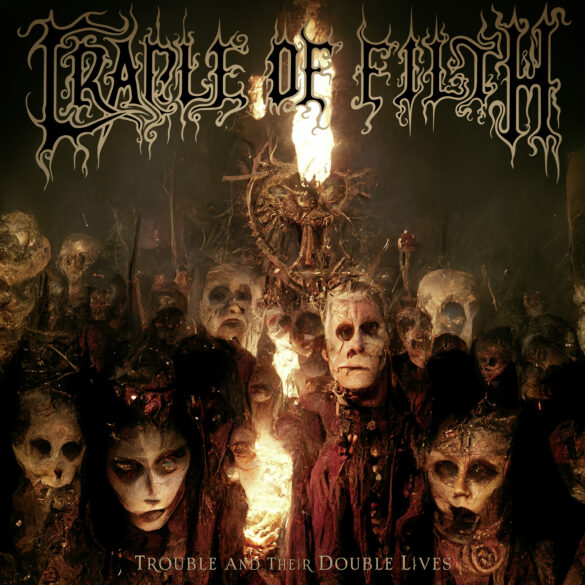
Photo: Anna Atlasman
Three decades is a long time for a band to exist, but Cradle of Filth have plenty left in the tank. Their latest, Trouble and Their Double Lives, is an 18-track live record spanning 2015-2019 and also features two new studio tracks that were recorded after Cradle’s last album, Existence is Futile, but didn’t make the stylistic cut for their to-be-announced next album. Since Trouble and Their Double Lives is out this Friday, Decibel caught up with enigmatic frontman Dani Filth to discuss the new release and what’s contributed to Cradle of Filth’s longevity.
You’ve done one live record before. Did you decide you want to show the modern era of the band?
I think the opportunity just arose because of the pandemic. Delayed one album and also delayed our transition from Nuclear Blast to our current label, Napalm, which put the writing back for the new album, which is now destined for next year. It left a window open and during that window, our sound guy announced he had been recording a bunch of shows. It’s one of those quick ideas that somebody germinated and suddenly we were looking at getting as many of the live concerts as possible to the studio engineer.
It’s about time. It’s 20 years between this and the last. It was just a matter of circumstance.
Was it a weird experience to be in the pandemic and listening to these live performances while we’re sitting at home?
It wasn’t necessarily anything to do with that. We were still finishing off mixing our album during the pandemic. It was the latter half that the opportunity arose because, despite finishing the record, we didn’t want to release it because there was no point. We couldn’t tour it. So the label delayed the album release by a year.
Just fortuitous where we realized we had the ammunition to put it together. Always wanted to call it Trouble and Their Double Lives, so it had to be a double live record. The reason we put two new songs on it was because the transition period between creating material left a couple of songs isolated and when we began the process of doing a new album, it left these two songs on their own. We were like, “This is a perfect place,” give the fans something current as well.
It was a nice touch to introduce ourselves to the current record label. It’ll be the first release on Napalm while the new album is being prepared. In fact, we go in to record the new album at the beginning of May. Studio release isn’t until next year.
Cradle has been a band since the 1990s but the lineup has changed quite a bit. Do you approach playing these songs live differently now?
No, I think just the same, really. When the new people come onboard, they’re learning something that we’ve been a part of for some time, so they integrate into the band. It’s a sort of morphing process. Obviously it’s a representation of where the band is at the moment and where my voice is. It’s a window into a certain epoch of Cradle of Filth.
When you were looking back on these performances, did revisiting the various of the band give you any inspiration?
Not really, no. It’s no different from playing festivals and touring, you’re playing a mixture of songs anyway. Most of the band won’t be privy to these tracks, we chose which ones and I went into the studio and oversaw it with the producer. The tracks already had been played, two members of the band weren’t even privy to it because they weren’t actually in the band while the material was being recorded, which was during the Cryptoriana album period.
Do you feel like the two new songs on the record indicate what the next Cradle of Filth will sound like?
Maybe a little bit but no. It’s pretty hard to explain, I can’t really talk about it. The new album has a Dusk and Her Embrace vibe to it. But no, we moved on from that. We started writing as a collective after that, these were stopgap songs that originally were intended toward a new album but because of the pandemic, it delayed everything and they found themselves out there. We just thought it was best to put them on the new record.
Cradle of Filth albums have always had distinct identities, so it makes sense that might not be the best indicator.
A record takes up so much of your time. It’s a monument to a band’s career, a lot of effort gone into it, a lot of time gone into it. It deserves its own sort of place and each album will have its own unique identity that’s in place due to whatever outside due influence is happening at the time. People in the band, when they recorded, there’s so many things that determine what an album’s about. Of course each and every one is hopefully going to have a very strong and different identity to the previous one and also the future one.
Would you say thinking like that has kept the band moving for so long? Do you think always looking toward the future has helped you stay alive a little bit?
Yeah, I think so. We’ve got very good, strong management team behind the band as well. Just come back from the tour with Dez from DevilDriver, we just came back from the co-headline tour with them. Dez [Fafara] is our manager, him and his wife, and they’re very strong. They put us in very good places.
We’ve got a very strong identity as a band and strong people to put that across, so we’re very lucky in that respect.
At this point in your career, what’s the most challenging thing about doing this?
I guess it is, and it’s not only just that. Other people emulate what you do as well, so if you have other vestiges of ideas simmering from stuff you’ve already done, sometimes you find it being taken over by other people. I’ve found that several times when I started to write a record, like somebody else has done this.
It’s hard to be original, it gets harder and harder. Everything’s a challenge, everybody would be doing it if it was easy to do, but it’s in our blood, it’s our nature, it’s our job. It doesn’t come easy, but it’s not unnatural.
Is it hard to maintain your voice at this point?
Not really, no. It’s just a set of rules that everybody lives by when they come to their jobs and how to perpetuate that. I have training to fall back on, relaxation, not overworking it, not underworking it. You’ve got to be clever with it and like I said, this is a job. This is what I do.
Halfway through my career, I found myself straining it and I went to see a guy who manipulates mainly opera singers’ voices and maintains those, and that gave me longevity as well. That perpetuated my career as well.
Do you plan on doing more legacy projects, things like this live album and remastered Cruelty and the Beast, or are you still focused on moving forward?
Moving forward. We’ve got a charity single with Ed Sheeran we’re doing this summer, then the new record, then not looking at anything else, just moving forward, as most people are.
Want more Cradle of Filth? Get the Principle of Evil Made Flesh Hall of Fame here.


